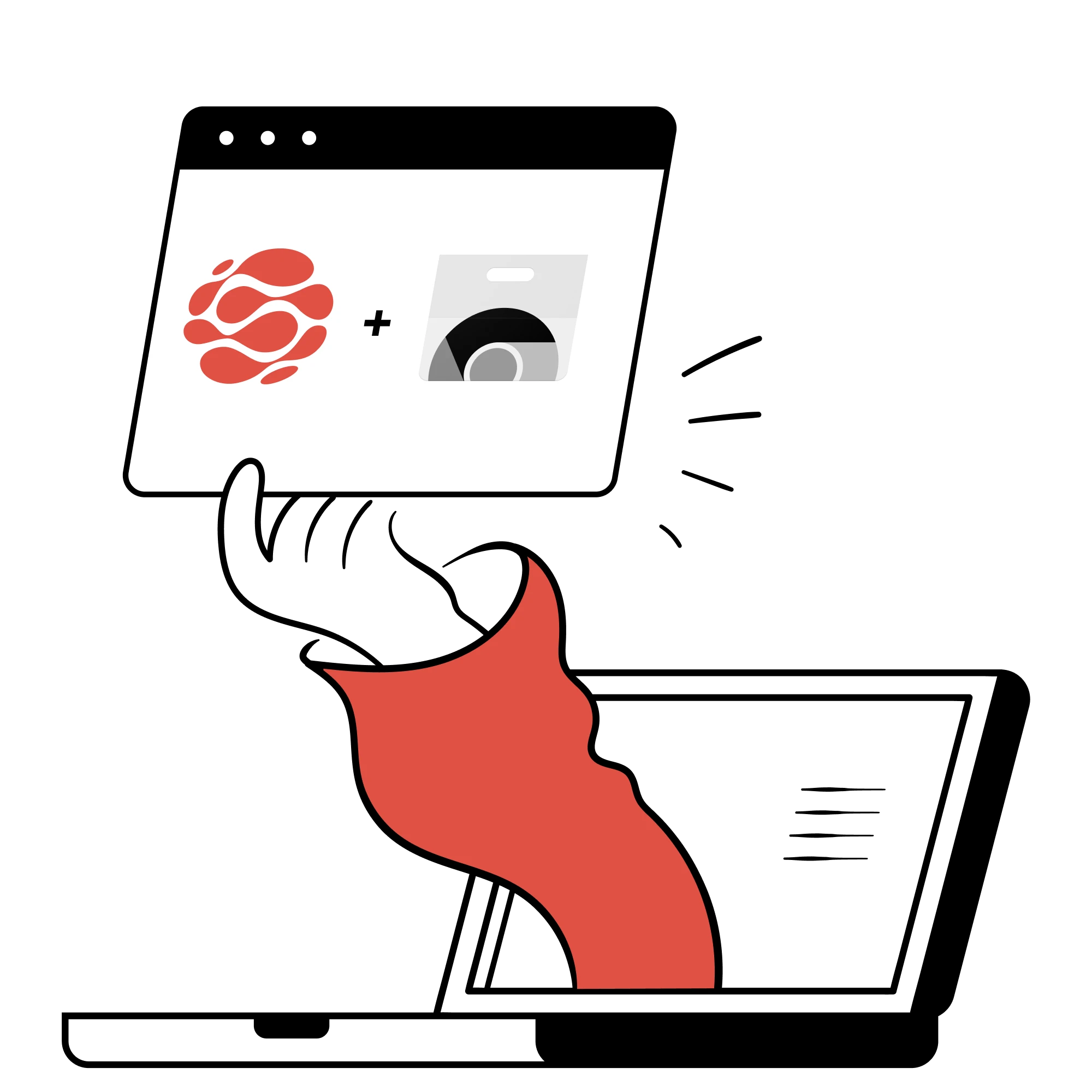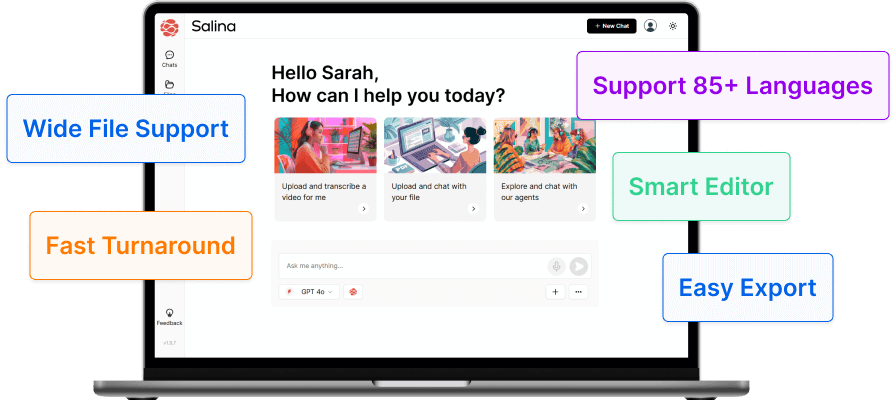Forget about one-size-fits-all emails! Let’s discover together what AI in email marketing is and how it personalizes messages for each subscriber, predicting their needs, and boosting overall engagement.
My fitness journey used to be a frustrating stop-and-start affair. I’d follow generic workout plans, quickly lose motivation, and fall back into old habits. Then, I discovered a fitness tracker with a personalized coaching program. It analyzes my activity data, sets achievable goals, and even suggests workouts tailored to my fitness level and preferences. It’s like having a pocket-sized coach constantly nudging me in the right direction.
This experience made me realize the power of AI in personalizing experiences. Just like that fitness tracker, email marketing automation powered by AI can transform how you connect with your audience. Imagine having a virtual marketing assistant that analyzes subscriber data, understands their preferences, and tailors your emails accordingly.
These features, along with personalization, are exactly what I craved in my fitness journey. Imagine applying them to your email marketing! No more generic blasts, but targeted communication that resonates with each subscriber, leading to a more engaged audience and improved results. Just like that “aha!” moment with my fitness tracker, AI in email marketing is poised to be a game-changer.
What is AI in Email Marketing?
AI in email marketing is the use of artificial intelligence to drive more intelligent, data-driven email communication and interactions. It is fueled by machine learning algorithms that learn from patterns in customer data and make predictions and decisions based on that data.
43% of marketers who use generative AI say that it’s most helpful for creating emails. From automating menial tasks to analyzing vast amounts of data, AI in email marketing is about enhancing the customer experience through higher personalization and more sophisticated targeting.
The Role of AI in Modernizing and Automating Email Strategies
AI’s main role is to help email marketing evolve beyond the ‘one size fits all’ approach. It does this by providing data-driven insights into customer behavior, which in turn allows for more targeted and effective email communication.
This modernization involves not just smarter campaigns, but also automated personalization. AI algorithms can change the email content or timing based on a recipient’s past behavior, saving marketers time and ensuring that each customer receives a tailored message.
Reflecting Nicolas Babin, the ex-CEO of Sony Europe and current leader of Babin Business Consulting, as he shared comparable views in his LinkedIn post on the influence of AI in optimizing Email Marketing.

Examples of AI Technologies in Email Marketing
The technology underpinning AI in email marketing can be divided into a few key areas:
- Predictive analytics: Using historical data to forecast future customer behavior.
- Machine learning for personalization: Adapting content to individual preferences based on observed data.
- Natural language processing (NLP): Understanding and responding to customer inquiries and feedback, even when they’re open-ended or nuanced.
- Automated segmentation: Creating audience groups without manual input based on AI’s interpretation of customer data.
- Algorithm-driven insights: Analyzing campaign performance and making optimizations in real-time.
How Does AI Work in Email Marketing?
AI in email marketing works by deeply analyzing customer data and carrying out complex tasks that would be impossible for a human or traditional software to perform. It can optimize everything from the subject line to the email’s send time for maximum impact, leading to an improved customer experience and consequently, better campaign results.
Decision-Making Based on Data Analysis
AI systems can analyze large datasets in real time to decide which variations of email content or designs are more likely to resonate with each segment of your subscriber base and make those decisions instantaneously, without human intervention.
Integrating AI with Email Platforms
Most email marketing platforms already have some level of AI integration, enabling users to take advantage of AI’s capabilities without needing to build everything from scratch. The key is to ensure that any AI solution is tightly integrated with your email marketing platform to make deployment and testing of AI-managed campaigns easy and efficient.
While some see the rise of AI, others are unaware of its importance. The Reddit thread above doubts the value of “email marketing,” but the growing role and impact of AI, especially in email marketing, will make it clearer to them soon enough.
Use of Algorithms in Email Campaigns
The heart of AI in email marketing lies in the algorithms that power its capabilities. These algorithms work tirelessly to make sure your campaigns are as successful as possible.
Targeting and Segmentation
AI algorithms can quickly sort through your customer data to identify patterns and create segments that might not be immediately obvious. By analyzing how different groups of customers behave in reaction to your campaigns, AI can also suggest ways to refine and target your segments more effectively.
Timing and Frequency Optimization
One of the most significant areas AI can help with is determining the best time to send an email to maximize open rates. It does this by taking into account when individual recipients have historically been most likely to engage with your emails.
Tool Recommendations
Features: HubSpot offers sophisticated AI and machine learning capabilities to enhance segmentation and personalization. Its predictive lead scoring helps in identifying the most promising leads, and the tool can optimize send times based on user engagement patterns.
Best For: Businesses looking for an all-in-one inbound marketing solution that includes CRM, email marketing, and more.
Features: Mailchimp uses AI to power its Send Time Optimization feature, which identifies the optimal time to send emails to your subscribers. Additionally, its segmentation tools are robust, allowing for dynamic content and automated behavioral targeting.
Best For: Small to medium-sized businesses that need a user-friendly platform with powerful automation and optimization features.
Predictive Analytics for Customer Behaviors
Predictive analytics in email marketing uses AI to forecast how your audience will behave, enabling you to prepare campaigns that are more likely to resonate and drive action.
Historical Data to Predict the Future
By examining past engagement, purchase history, and other interactions with your brand, AI can build predictive models that suggest what each customer is likely to do next — from making a purchase to becoming disengaged.
Case Studies in Predictive Analytics
There are numerous instances where leveraging predictive analytics has had a direct positive impact on email marketing campaigns. For instance, a retailer might use AI to predict when a customer might run out of a regularly purchased item and send them an email promoting a follow-up purchase at the most opportune time.
Tool Recommendations
Features: Optimove’s AI-driven software specializes in customer relationship management through predictive analytics. It uses customer data to predict future behaviors and lifecycle stages, allowing for highly targeted and timely email campaigns.
Best For: Companies focused on customer retention and personalized marketing campaigns that need sophisticated predictive analytics to drive decisions.
Emarsys (SAP Customer Experience)
Features: Emarsys leverages AI to provide predictive analytics in customer engagement. It offers solutions for understanding customer behavior patterns, predicting future actions, and automating personalized marketing campaigns across various channels, including email.
Best For: Organizations that prioritize omnichannel marketing and are looking for a platform that integrates predictive analytics with email marketing, social media, and more.
Personalization Through AI
Personalization has become non-negotiable in the email marketing world, and AI is taking it to new heights by enabling hyper-personalization.
Hyper-Personalization Through Data Analysis
AI can process and learn from each customer’s past interactions with your brand to deliver highly targeted, one-to-one communication at scale.
Strategies for AI-Driven Personalization
Implementing AI-driven personalization is a multi-step process that begins with collecting the right data. After that, it’s about letting the AI analyze and provide the tools to properly implement the personalized experiences it suggests.
Tool Recommendations
Features: ActiveCampaign leverages AI for predictive sending, and content recommendations, and to optimize email campaigns through machine learning. It’s highly effective at delivering personalized content to each subscriber based on their behavior and preferences.
Best For: Small to medium-sized businesses looking for a user-friendly platform with strong automation and personalization capabilities.
Features: Blueshift uses AI to enable smart segmentation and predictive recommendations, allowing marketers to send highly personalized email content. Its Predictive Intelligence engine automates the decision-making process for whom to target, when to reach out, and what content to deliver.
Best For: Businesses looking to leverage AI for sophisticated segmentation, predictive analytics, and automated personalized marketing across channels.
Case Studies: Successful AI Email Marketing Campaigns
Looking at examples of successful AI-driven email marketing campaigns can provide insights and inspiration for your own strategies.
Sephora’s Personalized Engagement Triumph
Sephora’s adoption of AI analytics for their email campaigns revealed the power of personalized product recommendations, significantly boosting engagement and sales. This approach demonstrated the effectiveness of tailoring content to customer preferences, leading to a 25% increase in click-through rates and a 9% rise in sales.
In the e-commerce sector, AI analytics is key for understanding customer behavior from initial contact to purchase. It offers critical insights into effective content and products, helping businesses optimize their marketing strategies for higher conversion rates. Sephora’s case underscores the value of personalization in achieving better sales outcomes.
WWF’s Donation Drive Boost
The World Wildlife Fund (WWF) made use of AI analytics to significantly enhance their email fundraising campaigns, leading to a notable 30% increase in donations. By employing data insights, they were able to adjust their strategies dynamically, ensuring that their outreach efforts were both timely and effective.
In the non-profit sector at large, the adoption of AI analytics has been transformative, enabling organizations to receive instant feedback on their fundraising campaigns. This real-time insight allows for swift and informed strategic adjustments, a tactic that has proven effective in increasing donations, as evidenced by the WWF’s success in optimizing its fundraising approach.
Key Takeaways
- AI analytics significantly enhances the personalization of email marketing campaigns, leading to increased engagement and sales.
- Predictive analytics can forecast customer behaviors, helping businesses target their marketing efforts accurately.
- Implementing AI in email marketing requires collecting relevant data and using tools that can analyze and utilize this data for personalized communication.
- Real-world success stories, like those of Sephora and WWF, demonstrate the effectiveness of AI-driven strategies in boosting outcomes.
- The selection of the right AI-powered tool, tailored to an organization’s specific needs, is crucial for the successful execution of AI-enhanced email marketing campaigns.
What’s Next
The future of AI in email marketing holds great promise! Marketers need to keep up with trends and use AI effectively in campaigns. Integrating AI into marketing strategies is crucial for creating seamless customer experiences.
With advanced AI technology like generative AI and predictive tools, email marketing is evolving. Using AI in email marketing strengthens customer relationships and boosts results. By continuously improving AI integration, businesses can gain a competitive edge and deliver added value to subscribers.





